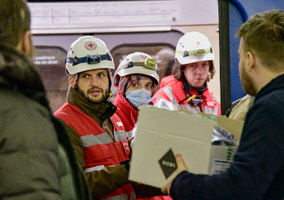The outpouring of anger and support for Ukraine has been heart-warming. A global coming together, momentarily bonding all of us with a common focus.
All of a sudden, my work in the humanitarian sector is of interest to friends and family in a way I have rarely experienced. The fact that many of my friends have also donated to the various Ukrainian appeals is even more surprising.
Indeed, the amount of money raised for Ukraine is truly staggering. The UK Disaster Emergencies Committee (DEC) appeal alone has raised more than £260m.
There is however growing concern within the humanitarian space about the many other contexts are not currently receiving either the level of attention of Ukraine, or the level of attention they deserve.
Without wanting to take away from the level of need in and around Ukraine, equally shocking and desperate need remains in Afghanistan, Ethiopia and Haiti.
Sadly, this is just to name but a few. For comparison the DEC appeal for Afghanistan raised about £30m.
This is not about some sort of grim top-trumps competition or about taking anything away from Ukraine, this is simply pointing out the facts – support for Ukraine has been vast, as it should be. Support for other disasters has lagged behind however, and I just wish the collective commitment towards Ukraine could be replicated globally.
How will funding be spent?
But a focus on numbers is only half the picture. There is a danger that humanitarian responses, including Ukraine, are judged on how much money is raised rather than how it is spent.
Beyond concerns I have about the imbalance in funding, having spent time on the ground in Ukraine, I have more pressing concerns about the ability for that funding to be spent well.
Despite weeks of telegraphing (if not years!), many humanitarian agencies did not prepare for the scale of the current disaster in Ukraine.
Some agencies remained in the country after the 2014 Crimea annexation, but many did not. As a result, they are now scrambling to find effective and efficient ways to respond now.
Over a month since the war began, much of the funding raised remains unspent. International agencies, many of whom have limited history or presence in Ukraine, sit on huge sums, looking for quick ways to respond to a complex and nuanced crisis.
Aid is best delivered by organisations embedded in communities
Effective humanitarian response requires local knowledge and understanding. It is based on relationships and cannot efficiently happen without communities taking a leading role.
As a result, aid is best delivered by organisations embedded in those communities; by those who understand community preferences and have established mechanisms to truly engage with those most in need.
Those rich in money, but poor in local history, presence, and relationships threaten to at best be inefficient, and at worse to do more harm than good. Given Ukraine has one of those rarities in the humanitarian sector – a well-funded response – this would be yet another tragedy in a war that needs no more.
Kai Hopkins is head of humanitarian programmes at World Jewish Relief, which has been working in Ukraine for over 30 years, and has an established network of 29 partners across the country
Related articles











